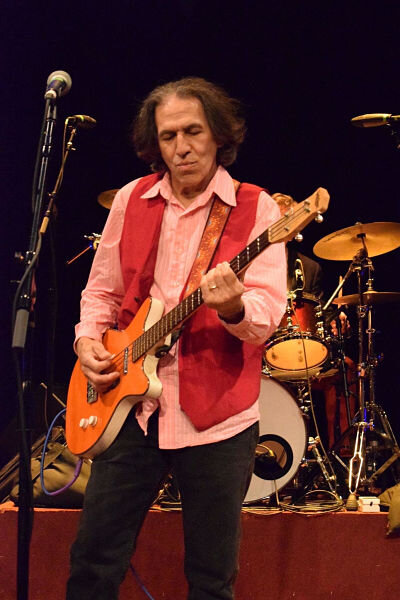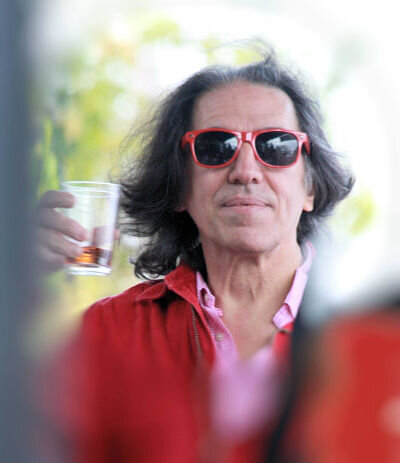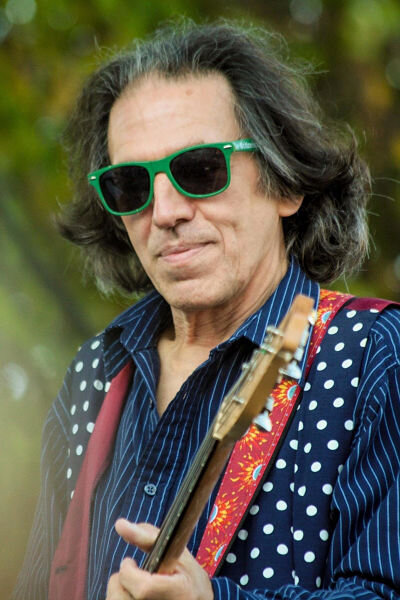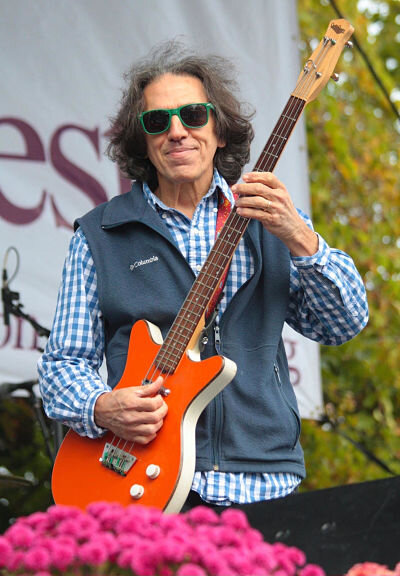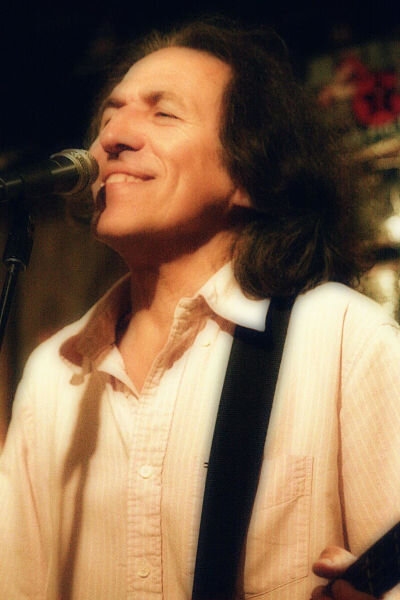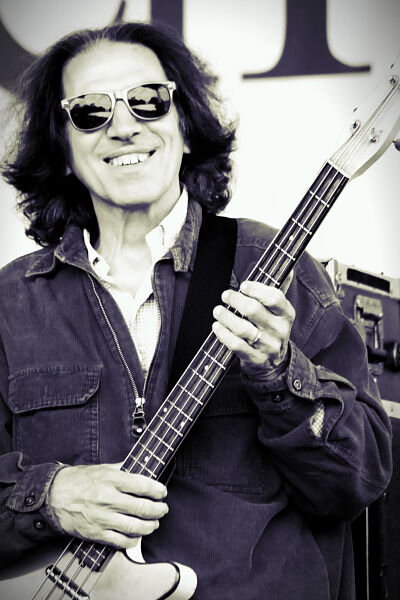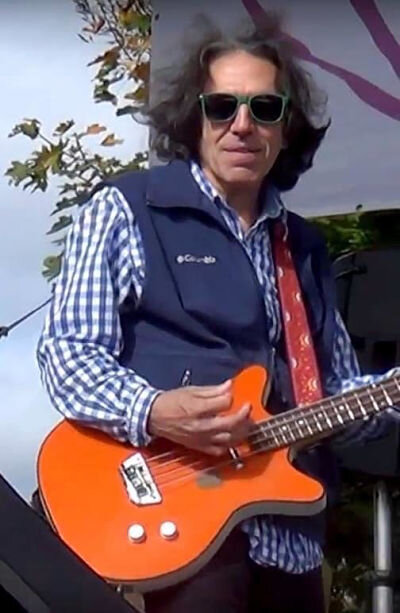Joey Spampinato (NRBQ)
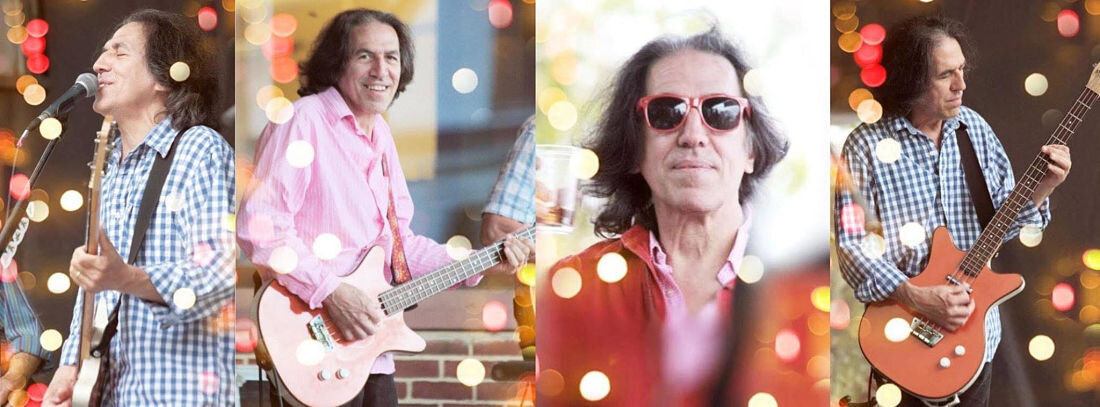

Photos by Beth Harrison
“He can play like a bass player, not like a bass guitar player. There’s a difference, believe me. And the last thing I wanted was somebody that sounded like a bass guitar player, because all of Chuck Berry’s stuff is basically made for upright bass and a swing thing. So Joey comes in and I’m amazed. How do you that?! You know, I’ve been around, but…” Keith Richards
Those are heavy words of praise from the co-founder, guitarist, vocalist, and co-principal songwriter of the Rolling Stones! And Joey Spampinato has equally heavy words of praise for all bassists: “I never heard a bass player I didn’t like!”
So, where did it all start for Joseph Nicholas Spampinato? There was always music playing in the Spampinato household, and Joey’s dad was a guitar player who showed him few things. However it was singing that got Joey rolling!
Spampinato grew up in the Bronx – a borough of New York City wherein doo wop music reigned supreme. It was a place where singers such as Dion were “Kings of the New York streets.” When Joey was young and impressionable, he sang everywhere with friends- including apartment building hallways with voice enhancing, booming acoustics. Joey also played alto sax in his elementary school band. When Joey was thirteen years old, he was asked to join an acapella singing group with guys whose ages ranged from 16-21.
When Joey was fifteen The Beatles conquered America, and everything changed for Spampinato and his generation. Overnight, Joey’s goal became to play bass in a rock and roll band like Paul and The Beatles. Though doo wop still had a presence, with songs such as “So Much in Love” by the Tymes, his acapella band was forced to rethink its strategy as “the times they were a changin.’
It was decided that the band would add a drummer and guitar player; Joey would play electric bass; one of the other singers would play keys, and the band which became known as The Seven of Us commenced to playing Top 40 hits. The band released a single on Red Bird Records, wherein Joey co-wrote the A and B sides, “Jamboree” and “It’s Not Easy To Forget.”
“Jambouree” https://youtu.be/XdYeCV0PzQw
“It’s Not Easy to Forget” https://youtu.be/C9SWKYNpkqo
Given Joey’s history and the times that influenced him, it makes sense that in addition to Paul McCartney, Joey was influenced by the bassists which dominated 1960s pop radio: Donald “Duck” Dunn, Brian Wilson, James Jamerson, and blues legend Willie Dixon.
Among first bass lines that attracted his attention was from Frankie Lymon and the Teenagers’ “Why Do Fools Fall In Love.” The bass work in particular influenced Joey’s sound – and has been traced back to either Abie Baker or Al Hall, both upright jazz players with the Jimmy Wright Band.
Frankie Lymon “Why Do Fools Fall in Love” https://youtu.be/2sAHiR0rkJg
In 1967, The Seven of Us were playing in Florida, and some of its members, including Joey, ended up merging with a few members of a band called Mersey-Beats USA, and that was the beginning of the New Rhythm and Blues Quintet. And later “Quartet.” NRBQ, or the “Q”, as it is lovingly referred to, became known for its live shows steeped in spontaneity, and an eclectic mix of rock, pop, country, folk, jazz, blues, and even Tin Pan Alley music.
The band’s debut album for Columbia in 1969 featured original songs spanning a wide range of musical styles, and included covers of Eddie Cochran and Sun Ra.
Dig “C’Mon Everybody” from the debut Q slab: https://youtu.be/cqfdr-6Vato
Joey spent the better part of the next four decades playing bass, singing and writing songs as a founding member of NRBQ. During that time, the band recorded multiple live and studio albums, as well as albums with Carl Perkins, Skeeter Davis, and the wrestling manager Captain Lou Albano.
Dig Q with Carl Perkins “Boppin’ the Blues” https://youtu.be/fYmwYWFgpNY
According to Joey, some of his favorite NRBQ albums are Grooves in Orbit, Message for the Mess Age, NRBQ (Rounder Records, 1999), and You’re Nice People You Are, a children’s record. For about a decade, Joey had the pleasure of his younger brother Johnny playing in the Q after Al Anderson left.
How Does Joey Do It! Joey’s primary right-hand technique is to play with his thumb. As I am also primarily a thumb player, I was wondering if his influence came from the same source as mine—seeing Brian Wilson play a Fender Precision bass with the finger rest below the G string. It turns out that Joey started playing with his fingers, but he always wanted to emulate the sound of an upright, and he found he could achieve that sound by playing the strings with his thumb while his hand acted as a mute down by the bridge. Another contributing factor is his preference for flat wound strings.
Joey’s playing is melodic, but he is a firm believer that “less is more.” His goal is to attain the sound and tone he wants, and to play simple. He describes Duck Dunn as a “seminar in simplicity.” Says Joey “listen to everything he does, [Duck] plays just what is needed.” He is also a fan of Willie Dixon for the same reason. Joey views the bassist as “the equivalent of a catcher in baseball. You need to be aware of everything going on, and adapt your playing to the players around you.”
Joey’s Weapons of Choice: Joey’s basses have included a Japanese starter bass, a Klira violin-styled bass, a Hofner bass that was modified by having luthier G.L. Stiles replace the neck and pickups, and cut F holes into the body. Unfortunately that bass was stolen years ago from a vehicle while the band was recording in New York, and has never been recovered….
For the first Q album, Joey played the G.L. Stiles bass, and a also rented Fender Jazz. Then he started playing a Rickenbacker, which he later used on the Carl Perkins recordings. Through the seventies he played a bass made by G.L. Stiles, pictured on the back of their Workshop album.
In the early 80’s, Al Anderson showed up at rehearsal with a black single cutaway and single pickup Silvertone bass he had bought at a yard sale for $35. Joey tried it, and immediately gave Al the $35! That was the beginning of Joey’s preference for Silvertone and Danelectro bass guitars.
In the mid-1980s, while living in Nashville, Joey became a fan of the Jerry Jones double cutaway basses that were based on the Danelectro model, and he had two orange basses custom made. Those have been his go-to basses, though he’ll sometimes use his hand made Hoyt bass in the studio. While he prefers to play fretted basses while singing, Joey does have a fretless Danelectro, a gift from E Street bassist, Gary W. Tallent.
Joey’s old go-to amp rig was an Ampeg SVT. These days he favors a Fender BXR 300 1×15 combo amp, with an extension cabinet, that gets him the warm tube and upright tone that is his signature.
Joey, Keith, and Chuck Berry: In the late 1980s, Keith Richards produced a documentary on his idol, Chuck Berry entitled Hail! Hail! Rock n’ Roll to celebrate the iconic rocker’s 60th birthday. Comprised of a footage from rehearsals and a tribute concert starring Chuck, along with special guests Linda Ronstadt, Eric Clapton, Robert Cray, Bobby Keys, and Julian Lennon, among others, Keith chose Joey as the bassist after seeing the Q at the Bottom Line on the recommendation of drummer Steve Jordan. For the film, Joey played a white Jerry Jones Long Horn.
As Chuck Berry was notoriously volatile, Joey was prepared in the event he was called on the carpet. Turns out that Joey learned one of the songs, just as it was played on the record, which included a walk-up bass line to the root note of the key. When Chuck said he wasn’t playing the song right, Joey explained he had played what was on the record, but he was happy to play it any way Chuck wanted. The next morning, Chuck came in, walked up to Joey, and said “Mr. Bass Player, YOU WERE RIGHT!” It was a great experience being part of that band, and having the respect of Chuck Berry.
Dig Joey, Keef, and Chuck: “Nadine” https://youtu.be/5madtiLf7DI
Dig Joey and Keef rendering backing vocals for Linda and Chuck “Back in the USA” https://youtu.be/ERVLy-ltjHs
Much of Joey’s songwriting was for the Q, but his songs have been recorded by other artists.
Joey played on Bonnie Raitt’s LP Fundamental, which included “I Need Love.” Shakin’ Stevens covered “Don’t She Look Good.” Darlene Love and She and Him covered “Christmas Wish.” Daryl Hall, in a tribute to former Hall and Oates’ bassist, T Bone Wolk covered “If I Don’t Have You,” which was one of T Bone’s favorite songs.
Bonnie Raitt “I Need Love” https://youtu.be/ByYD5L7F2qw
Darlene Love “Christmas Wish” https://youtu.be/HJr7HV1OZuw
Darryl and T Bone “If I Don’t Have You” https://youtu.be/-G4TOZqrJzk
Joey has many high points in his storied career. Recording an album with his hero, Carl Perkins; being in the same band for almost four decades; anchoring the Q and The Spampinato Brothers with Johnny; having Bonnie Raitt join the Q anytime they were in the same town; and having Keith pick him to be in the band for the Chuck Berry documentary. Each of those events is huge yet there are more highlights Joey’s story…
Eric Clapton was among the artists who was a special guest in the Hail! documentary, and he and Joey hit it off. In 1991, Eric hosted 24 Nights at the Royal Albert Hall, a series of shows where he played six nights of blues, six nights of hits, six nights with an extended band, and six nights with an orchestra. Impressed with Joey’s musicianship, Eric had Joey play bass on the six nights of blues.
It was a treat for Joey to be part of the show with Eric Clapton, and other ace guitarists, but also, to be able to play at the historic Royal Albert Hall.
Another highlight was being invited to jam with Paul McCartney and his band at the Mill in England, where Paul rehearses and records. Paul had previously told Joey that he should look him up if he is in England. Joey reached out to Paul, and the next day, a car picked him up to take him to play with the man who inspired him to sing, play bass and write songs!
With all these great experiences, could one possibly think of anything more they’d like to happen to them? YES! Being animated on The Simpsons! Besides having many of their songs appear on the show, the Q may be the only band that ever appeared in an animated form as well as on camera performing the show’s theme song during the end credits.
NRBQ on The Simpsons https://youtu.be/6FP0HTMVl9M
These days, you can catch Joey playing again with brother, Johnny, in The Spampinato Brothers. They have 3 rockin’ releases, Pie In The Sky from 2010, Smiles from 2013, and now Decorangements. Information about the band and these CDs can be found at https://www.spampinatobrothers.com/
Dig Q on Night Music with David Sanborn “Wild Weekend” https://youtu.be/PQ5UlyBgHN8
Dig The Spampinato Brothers “Rocket in my Pocket” https://youtu.be/pBvVudD8xQ4
Check out Joey’s playing along with a brief description of his bass lines:
The Spampinato Brothers- “Japan” https://youtu.be/HweILbx17Ps “Keeping it simple. Let the song do all the talking. No French pastry needed.”
NRBQ-“Everybody’s Smokin” https://youtu.be/Z6PSKLdsOdc “This song was written on stage as an improv by everybody, with Terry Adams making up words as we went along, and everybody on stage was smoking. Al Anderson played a wild chord, and I was playing a spacey bass line. By the time we were recording Message For The Mess Age, I wrote the bridge, and we recorded the song…”
NRBQ-“Like A Locomotive” https://youtu.be/qkXABTqVC2Q “I play a moving bass line on the bridge that only touches on the root, and I weave my way around the chords.”
Joey’s Legacy:
Mike Berman, bassist: …been a Q fan since 1970. They used to play a lot of the clubs around the the Woodstock/Kingston NY area where I lived. Saw them dozens of times and also later when they played in NY City clubs. Joey was a huge inspiration for me. That Jerry Jones/Dano bass into the full SVT cabs delivered deep deep low end but never overpowering. His style is totally unique. I have followed him through his post-Q time with the Spampinato Brothers. Hoping to see Joey out playing again some day soon!
Sal Maida, bassist (Roxy Music, The Sparks, Cracker, The Runaways): Joey Stampinato’s bass technique is totally unique in that it is not only melodic but extremely percussive. Like an upright player slapping some genuine rock n roll patterns that is both retro and forward looking at the same time.
Jon Pousette- Dart, composer /recording artist: There are a chosen few in a place that hold a candle with Joey. Jamerson,McCartney, and many names I couldn’t possibly recall, but Joey’s place is in it’s own space of knowing, realizing and paying tribute to every song he touches. It’s good on a whole other plane. Original Q was a place few bands or players touch. His songs remain among my favorite of all time.
Check out the Joey Spampinato KYBP Photo Gallery by Beth Harrison!
